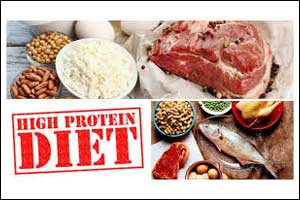- Home
- Editorial
- News
- Practice Guidelines
- Anesthesiology Guidelines
- Cancer Guidelines
- Cardiac Sciences Guidelines
- Critical Care Guidelines
- Dentistry Guidelines
- Dermatology Guidelines
- Diabetes and Endo Guidelines
- Diagnostics Guidelines
- ENT Guidelines
- Featured Practice Guidelines
- Gastroenterology Guidelines
- Geriatrics Guidelines
- Medicine Guidelines
- Nephrology Guidelines
- Neurosciences Guidelines
- Obs and Gynae Guidelines
- Ophthalmology Guidelines
- Orthopaedics Guidelines
- Paediatrics Guidelines
- Psychiatry Guidelines
- Pulmonology Guidelines
- Radiology Guidelines
- Surgery Guidelines
- Urology Guidelines
Eating too much protein might increase heart failure risk in men

In middle-aged men, the consumption of high protein diet may be associated slightly with an increased risk of heart failure (HF) as compared to those who ate less protein, according to a new study published in the journal Circulation: Heart Failure. In this study, proteins from eggs and fish were not found to be associated with heart failure risk.
The study was conducted by Jyrki Virtanen, an adjunct professor of nutritional epidemiology at the University of Eastern Finland in Kuopio, and colleagues to examine the associations of proteins from different food sources with the risk of HF. This research is significant as, despite the popularity of high protein diets, there is little research about how diets high in protein might impact heart failure risk in men.
As many people seem to take the health benefits of high-protein diets for granted, it is important to make clear the possible risks and benefits of these diets," said Jyrki Virtanen, PhD, study author and an adjunct professor of nutritional epidemiology at the University of Eastern Finland in Kuopio. "Earlier studies have linked diets high in protein - especially from animal sources -- with increased risks of type 2 diabetes and even death."
For the study, the researchers studied 2,441 men, age 42 to 60, at the study's start and followed them for an average 22 years. Overall, researchers found 334 cases of heart failure were diagnosed during the study and 70 percent of the protein consumed was from animal sources and 27.7 percent from plant sources. Higher intake of protein from most dietary sources, was associated with slightly higher risk. Only proteins from fish and eggs were not associated with heart failure risk in this study, researchers said.
Key Findings:
- Higher intake of protein from most dietary sources, was associated with slightly higher risk.
- Proteins from fish and eggs were not associated with heart failure risk.
- Based on the comparison between men who ate most protein to those who ate the least, the researchers found that the risk of heart failure was 33 percent higher for all sources of protein; 43 percent higher for animal protein; 49 percent higher for dairy protein and 17 percent higher for plant protein.
"As this is one of the first studies reporting on the association between dietary protein and heart failure risk, more research is needed before we know whether moderating protein intake may be beneficial in the prevention of heart failure," said Heli E.K. Virtanen, MSc, first author of study, PhD student and early career researcher at the University of Eastern Finland in Kuopio. "Long-term interventions comparing diets with differential protein compositions and emphasizing differential protein sources would be important to reveal possible effects of protein intake on risk factors of heart failure. More research is also needed in other study populations."
For further information click on the link: https://doi.org/10.1161/CIRCHEARTFAILURE.117.004531

Disclaimer: This site is primarily intended for healthcare professionals. Any content/information on this website does not replace the advice of medical and/or health professionals and should not be construed as medical/diagnostic advice/endorsement or prescription. Use of this site is subject to our terms of use, privacy policy, advertisement policy. © 2020 Minerva Medical Treatment Pvt Ltd